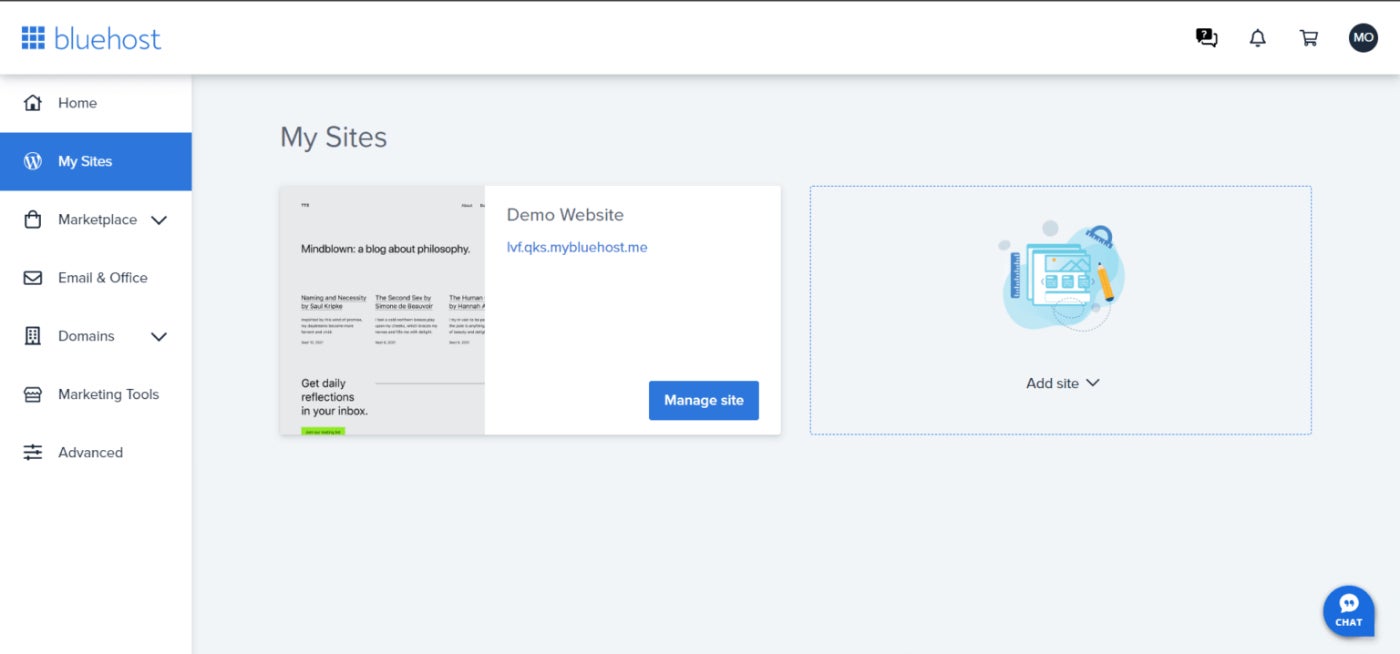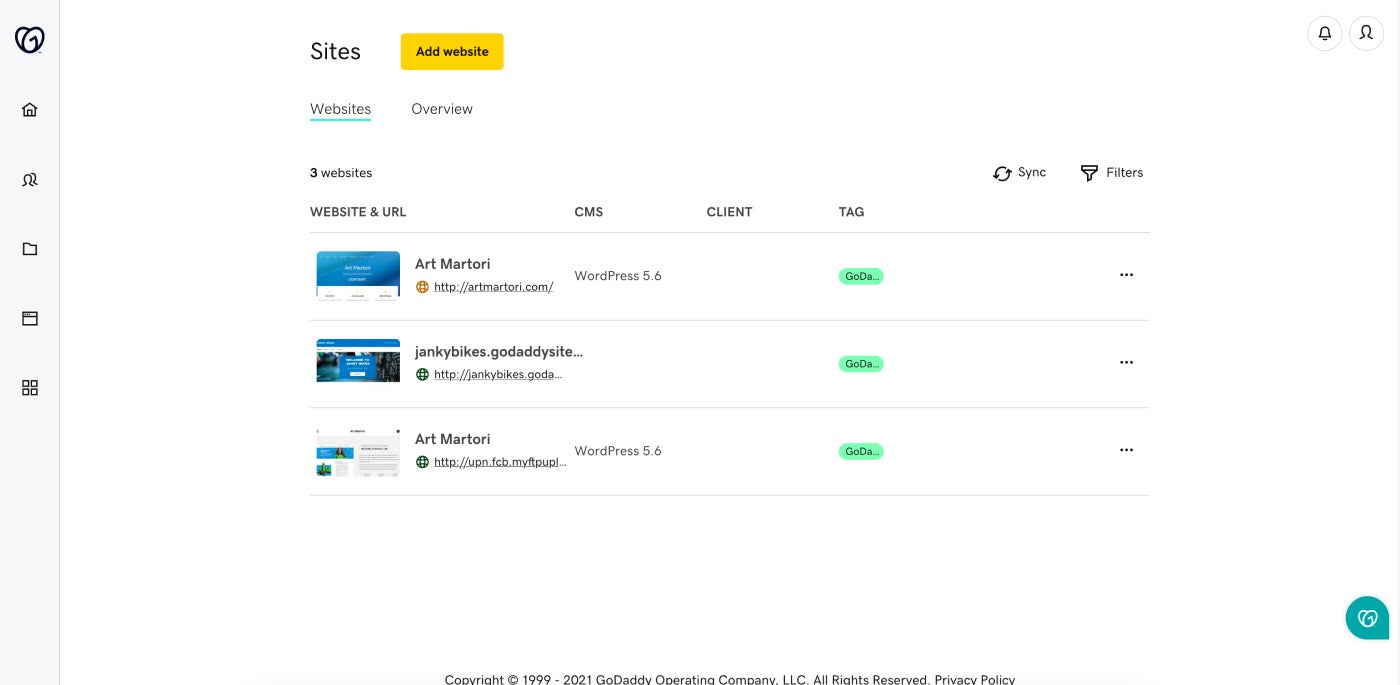When I started comparing Bluehost vs GoDaddy, I quickly realized that while both offer a wide range of hosting solutions, they cater to slightly different needs. Bluehost shines with its seamless WordPress integration and beginner-friendly setup, while GoDaddy dominates in domain registration and a robust suite of business tools. In this breakdown, I’ll walk you through pricing, features, ease of use, and customer support to help you decide which one’s right for you.
Table of Contents
Bluehost vs GoDaddy fast facts
Bluehost
- Starting at: $2.95/month
- Best for: WordPress integration
- Includes: Free domain & SSL
- Control panel: cPanel
GoDaddy
- Starting at: $5.99/month
- Best for: Domain registration
- Includes: Website builder tools
- Control panel: Custom
Overview and key differences
Before we dive into the detailed comparison of GoDaddy vs. Bluehost, let’s look at how each stands out in the comparison of website hosting services.
Bluehost overview
Founded in 2003, Bluehost is a top choice for WordPress hosting and is known for its beginner-friendly interface, security features, and reliable performance.

Pros of Bluehost:
- Optimized for WordPress (officially recommended).
- Free domain and SSL for the first year.
- cPanel interface for easy management.
- Strong security with backups and malware protection.
Cons of Bluehost:
- Higher renewal rates after the initial term.
- Limited free migrations (only for WordPress sites).
- No monthly billing on basic plans.
GoDaddy overview
Launched in 1997, GoDaddy is a major domain registrar and hosting provider with a wide range of business and marketing tools.

Pros of GoDaddy:
- Great for domain registration and management.
- Low introductory prices on hosting.
- Scalable hosting plans (shared, VPS, dedicated).
- 24/7 phone support available.
Cons of GoDaddy:
- Many essential features cost extra (SSL, backups).
- Live chat support can be slow with upselling tactics.
- Custom control panel (no cPanel on shared hosting).
Pricing and plans
Bluehost pricing
- Shared Hosting: Starts at $2.95/month – Free domain, SSL, 10GB+ SSD storage.
- VPS Hosting: Starts at $46.99/month – 2 CPU cores, 4 GB RAM, 100GB NVMe.
- Dedicated Hosting: Starts at $141.19/month – 4 CPU cores, 4GB RAM, 500GB RAID 1 storage.
GoDaddy pricing
- Web Hosting: Starts at $5.99/month – 1 website, 25 GB NVMe storage.
- VPS Hosting: Starts at $8.99/month – 1 vCPU, 2GB RAM, 40 GB NVMe SSD Storage.
- Managed WordPress Hosting: Starts at $7.99/month – 10 GB NVMe storage.
Note: Prices may vary. Visit Bluehost and GoDaddy’s official websites for the latest rates.
Which is better for pricing?
Each web hosting service has one or two plans with lower starting prices than the other, but GoDaddy has more affordable options.
Read: Web Hosting for Small Business: Which is Best for Pricing, Tools, Performance, and Flexibility?
Ease of use and control panel
Bluehost
- Uses cPanel for hosting management.
- 1-click WordPress install and staging environment.
- SSH access, Git integration, and cron jobs for developers.
GoDaddy
- Uses a custom control panel (no cPanel on shared plans).
- Limited MySQL database and SSH access.
- GoDaddy Website Builder available (but lacks flexibility).
Which is better for ease of use?
Bluehost is the better choice for ease of management and control due to its familiar cPanel interface, staging tools, and developer-friendly features.
Performance and speed
Bluehost performance
- Fast server speeds with SSD storage and built-in caching.
- Cloudflare CDN integration for better global performance.
- Handles high traffic well with optimized WordPress hosting.
- Strong backend infrastructure to reduce slowdowns.
GoDaddy performance
- Slower response times on shared hosting plans.
- No built-in caching on basic plans (CDN required for speed boost).
- May struggle with high traffic spikes unless on premium plans.
- Servers optimized for domain hosting rather than web performance.
Which is better for performance and speed?
Bluehost is the better choice for faster load times, built-in caching, and performance optimizations, making it ideal for websites that require speed and stability. GoDaddy’s speed varies by plan, and achieving optimal performance often requires paid add-ons, making it less cost-effective for users needing high-speed hosting.
Features and hosting services
Bluehost
- Free SSL and daily backups on most plans.
- Unlimited MySQL databases and support for PHP 7.x/8.x.
- Cloudflare CDN integration for faster page loads.
- WooCommerce-ready hosting with optimized performance.
GoDaddy
- SSL and backups cost extra on basic plans.
- Limited MySQL databases on shared hosting.
- Better domain registration tools than Bluehost.
- GoDaddy Website Builder for simple site creation.
Which is better for features?
Bluehost includes built-in security and performance tools, while GoDaddy focuses more on domain management and business services.
Customer support
Bluehost
- 24/7 phone, live chat, and ticket support.
- Faster response times compared to GoDaddy.
- Trained WordPress experts available.
GoDaddy
- 24/7 phone and live chat support.
- Live chat wait times can be long.
- More upselling tactics during support interactions.
Which is better for customer support?
Bluehost provides quicker responses and better WordPress expertise, while GoDaddy’s support can be inconsistent with frequent upsells.
Which should you choose?
Who should choose Bluehost?
Choose Bluehost if you:
- Use WordPress and want optimized hosting.
- Need a free domain and SSL included.
- Prefer cPanel for website management.
- Want built-in security with backups and malware protection.
Who should choose GoDaddy?
Choose GoDaddy if you:
- Prioritize domain registration and bulk management.
- Run a business website with marketing tools.
- Prefer phone support over live chat.
- Need a basic hosting plan and don’t mind extra costs for features.
Which provider offers better value?
For WordPress hosting, security, and performance, Bluehost is the better option. For domain registration and business services, GoDaddy is a stronger choice.
Bluehost vs GoDaddy alternatives
Still on the fence between Bluehost or GoDaddy? There are a few other hosting providers that might be a better fit depending on what you need — whether that’s ease of use, stronger support, or different pricing options.
DreamHost
DreamHost is a solid pick if you’re looking for reliable performance and a platform that’s easy to manage. It has a good reputation among users and offers strong built-in security with features like free SSL and daily backups. The custom dashboard is simple to use, which makes site management less of a hassle — especially if you don’t want to deal with cPanel.
Squarespace
Squarespace might be a better fit if you’re more focused on building a clean, good-looking site without touching code. It has an AI site builder that helps speed up the design process, especially for beginners. It’s more of a website builder than a full hosting platform, but it gets the job done with minimal setup for portfolios, small businesses, or creative projects.
ScalaHosting
Scala Hosting is a good option if you’re after something that balances performance, security, and support. It includes features like free malware scanning, a custom control panel (SPanel), and helpful support available when needed. It’s especially appealing if you want more control than typical shared hosting without jumping straight into a full VPS.
How hosting impacts website speed and SEO
Hosting isn’t just about keeping your site online — it also plays a role in how fast your pages load and how they rank in search engines. Site speed is a key factor in Google’s Core Web Vitals, and slow-loading sites can negatively affect user experience and bounce rates.
A good host provides fast server response times, caching support, and a content delivery network (CDN) — all of which contribute to faster load times. If SEO matters to you, especially for content-heavy or ecommerce sites, it’s worth looking beyond just price and considering how your host handles performance under pressure.
Migrating your site: What to expect from Bluehost and GoDaddy
If you’re switching hosts, migration support can save you hours. Bluehost offers free WordPress site migration, but only for one site. GoDaddy charges a fee and doesn’t include free migration on shared plans.
Both providers offer migration guides, but unless you’re comfortable handling files, databases, and DNS changes manually, you’ll want to factor in ease of transfer — especially if you manage multiple websites.

